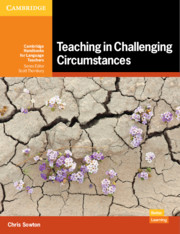Book contents
- Frontmatter
- Contents
- Thanks
- Acknowledgements
- Introduction
- I Creating a good environment for language learning
- II Being effective in the classroom
- III Teaching large classes
- IV Teaching language skills and systems
- V Teaching language without textbooks
- VI Teaching language with textbooks
- VII Helping students achieve their potential
- VIII Linking the school to the outside world
- IX Supporting yourself and others
- Glossary
- Index
18 - Using the local environment
Published online by Cambridge University Press: 22 September 2021
- Frontmatter
- Contents
- Thanks
- Acknowledgements
- Introduction
- I Creating a good environment for language learning
- II Being effective in the classroom
- III Teaching large classes
- IV Teaching language skills and systems
- V Teaching language without textbooks
- VI Teaching language with textbooks
- VII Helping students achieve their potential
- VIII Linking the school to the outside world
- IX Supporting yourself and others
- Glossary
- Index
Summary
Using the local environment enables children to develop a sense of belonging to the local community. It helps them to develop a sense of place which in turn will develop their feelings of security.
The British Association for Early Childhood EducationThe short version
1 In our busy, day-to-day lives, we often don't see the language opportunities which are right in front of us.
2 When using the local environment, learning can be deepened as students not only see and hear, but touch, taste and smell.
3 Learning walks are one type of activity which enables students to engage with where they live, and to learn.
4 Community mapping is another activity, through which students can learn more about where they live (and each other).
5 Any activities you do should be adapted to the specific characteristics of the local area.
Introduction
1 How can the local environment be used for language learning? (If you haven't looked at ▸Chapter 17 already, you might benefit from reading it before moving on to this chapter.)
2 Look at the photos below. How might you use these environments to teach language?
Learning and the local environment
In Teaching Without Textbooks, Edward John Wade describes how, as a volunteer teacher in 1963 he was recruited to start up, alone, an Australian government primary school deep in the rainforests of New Guinea. Having lost the few materials he had in an accident, he describes how, impelled by the children's needs and interests, he covered the primary school curriculum by working from what was immediately available. ‘I asked the children to show me what they wanted to know about, and gradually introduced English through their responses. …We did our math and science in the bush by estimating how many kernels we could get from an ear of corn. We checked with the villagers where and how far apart we should plant them, and how big an area we would need to clear …’ and so on.
When he finally saw a copy of the primary school syllabus, he was gratified to find that he had ‘covered’ just about every item listed.
- Type
- Chapter
- Information
- Teaching in Challenging Circumstances , pp. 114 - 119Publisher: Cambridge University PressPrint publication year: 2021



